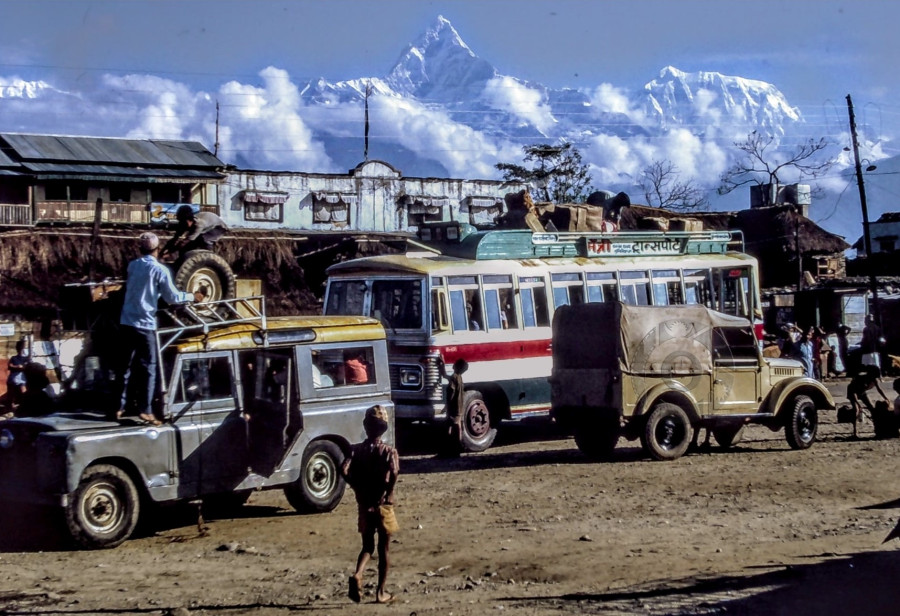Columns
A case against nostalgia
The past would seem better if one belonged to the upper castes or were associated with royalty.
Amish Raj Mulmi
There is wide consensus that Kathmandu Valley—and its cities—were in a better shape in the past. Pictures of a bucolic past, with green fields, clean rivers and emptier roads flood social media on a daily basis. Such nostalgia extends to other places—from "untouched" trekking trails and regions such as Mustang to towns like Pokhara—and ideas of governance and politics (it is no longer uncommon to hear a nostalgic ode to royal rule vis-à-vis the current political state of the country).
Rapid and shambolic urbanisation across Nepal’s cities has resulted in concrete jungles, so it’s not surprising that nostalgia is effectively a permanent state of mind, at least among the older generation. Of course, the past would seem better if one belonged to the upper castes or were associated with royalty in some form or the other. But that alone does not explain the widespread—even global—prevalence of nostalgia. It seems to be everywhere, and especially so in an era like ours, troubled by wars, a pandemic, economic downturns, and nationalist politics that effectively thrive on projecting a "golden" past.
Nostalgia is not new, or unique to us. Hindu scriptures tell us how the first "yuga"—Satya Yuga—was an era of dharma and truth, and each successive cycle of time has seen the decline of morality and virtues, resulting in today’s Kali Yuga, an era of moral decay and corruption. The Brahmanical nature of such definitions aside, Hindu civilisational states are not alone in their veneration of the past. Islamists such as Daesh often harken back to the age of Mohammed, and prescribe the sharia in response. Trump’s "Make America Great Again" calls upon similar visions of the past. The Chinese continue to regard the "century of humiliation" as a historic aberration that must be corrected for the nation to reclaim its greatness. For that matter, nationalism itself is founded on xenophobic nostalgia, with politicians making merry on a promise of return to a great past from a corrupt present.
Nostalgia goes beyond the political or religious spheres, often making an appearance in the social sciences too. As anthropologist David Graeber and archaeologist David Wengrow have discussed in their recent book, The Dawn of Everything, our imagination of human history—and of civilisation—is dominated by either the Hobbesian philosophy that the "first humans" were always in a state of war, and thus the advent of civilisation—with modern nation-states, a rule of law and so forth—represents progress from such anarchic times; or Rousseau’s idyllic state of nature, one in which the human race lived in harmony with nature until the advent of civilisation because agricultural processes resulted in a forced clampdown of rights and freedoms via the imposition of laws. As Graeber and Wengrow convincingly show via diverse examples from across the world, neither is correct.
Imaginations of the past
Nostalgia and Rousseau’s vision of the past seem to go hand-in-hand. In today’s era of climate change and widespread environmental devastation, this should not come as a surprise, although we conveniently seem to forget our present and future dilemmas are the result of our past endeavours. The rural idyll remains an equally common trope in Nepal. Once, when all of us lived in villages, we were uncorrupted by moral vices such as corruption and crime, which belong to the cities, it is suggested. Our films seem to suggest so, so do many of our commentators. We are also called upon to recognise multiple "golden eras"—sometimes of the Mallas or the Shahs, at other times even further back, of the Licchavis. Modernity is rejected wholesale; migrants are believed to have corrupted our cities with alien and unwelcome behaviours and practices. Tradition and culture is to be preserved against degradation, for they’ve been handed down from our ancestors, those who knew better than us.
Much of this is nonsense. The reality of farming does not live up to the romance of pastoral life. Discounting the fact that industrial pollution is a more recent phenomena in the country (and in the world), even the argument that our cities were cleaner in the past needs to be carefully queried. Several historical accounts by travellers to Nepal Valley suggest sanitation was an issue (as it was in most urban areas historically—"I can certify that the offensive smells, even in that short whiff, have been of a most head-and-stomach-distending nature," wrote Charles Dickens about the Thames River). The rigidity of caste was much more formidable, and few could break the wheel. Power structures were top-oriented; aspirations limited; and occupations hereditary.
The imaginations of our past is, ironically, also built upon foreign accounts that reduce Nepal to exoticism. Once again, Rousseau’s narrative about a state of innocence makes its presence felt. Nepal was a place of "lost kingdoms", a "last Hindu kingdom", a Shangrila for those who sought it—a place where one could return to their "roots". Visual narratives emphasise a pastoral dream, with rice fields as far as the eye could stretch, or mountain-villages untouched by the corruption of modern industrial and consumer practices. With every passing year, one begins to rue what once was.
Yesterday wasn’t better
Perhaps if we turned the map of our past around, we could get over the ephemera of nostalgia. Bad urban planning or environmental degradation does not mean one needs to turn to the past. Such problems have solutions; we have to first open our minds to them. The roads criss-crossing our hills are not the issue; rather, our preference for below-par civil engineering and kickbacks is what turns our hills naked. It’s the same with society, or politics, or history.
Nostalgia is addictive like morphine. In Nepal, we seek its refuge partly because of shoddy development practices and all-pervasive political mismanagement, but mostly because we refuse to acknowledge the past could be as bad, if not worse, than the present. "Yesterday, all my troubles seemed so far away", sang the Beatles. We nod our heads in unison, quietly agreeing with Messrs Lennon and McCartney, unwilling to consider the future could be better.




 11.12°C Kathmandu
11.12°C Kathmandu















